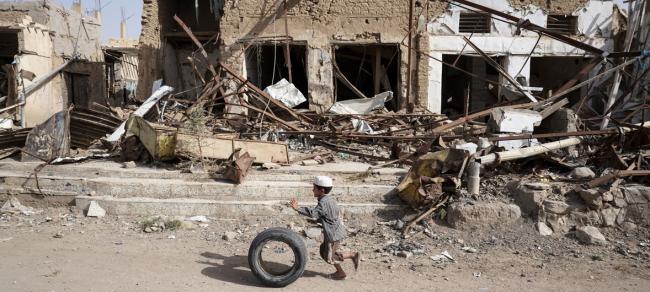
Yemen: United Nations experts point to possible war crimes by parties to the conflict
Geneva, Aug 28 (IBNS): Information documented by the Group of Regional and International Eminent Experts on Yemen strongly suggests that parties to the armed conflict have perpetrated, and continue to perpetrate, violations and crimes under international law.
The findings are detailed in a 41-page report published on Tuesday by the Group Experts, which was mandated by the United Nations Human Rights Council to carry out a comprehensive examination of the human rights situation in the country.
The Group of Experts’ report, which covers the period from September 2014 to June 2018, analyses the main patterns of violations and abuses of international human rights law, international humanitarian law and international criminal law committed by parties to the conflict.
The report also identifies significant areas where violations and abuses may have been committed but further investigation is required.
Among their conclusions, the experts say individuals in the Government of Yemen and the coalition, including Saudi Arabia and the United Arab Emirates, and in the de facto authorities have committed acts that may, subject to determination by an independent and competent court, amount to international crimes.
The report notes that coalition air strikes have caused most direct civilian casualties.
The airstrikes have hit residential areas, markets, funerals, weddings, detention facilities, civilian boats and even medical facilities.
Based on the incidents they examined, the Group of Experts have reasonable grounds to believe that individuals in the Government of Yemen and the coalition may have conducted attacks in violation of the principles of distinction, proportionality and precaution that may amount to war crimes.
“There is little evidence of any attempt by parties to the conflict to minimize civilian casualties. I call on them to prioritise human dignity in this forgotten conflict,” said Kamel Jendoubi, chairperson of the Group of International and Regional Eminent Experts on Yemen.
According to United Nations Human Rights Office, since March 2015 up to 23 August 2018, 6,660 civilians were killed and 10,563 injured; however, the real figures are likely to be significantly higher.
The coalition has imposed severe naval and air restrictions in Yemen, to varying degrees, since March 2015. There are reasonable grounds to believe that these restrictions imposed by the coalition constitute a violation of the proportionality rule of international humanitarian law. Moreover, the effective closure of Sana’a airport is a violation of international humanitarian law protection for the sick and wounded. Such acts, together with the requisite intent, may amount to international crimes.
The Group of Experts also found that many parties fighting in Ta’izz have been responsible for civilian casualties. The alleged use by the Houthi-Saleh forces of weapons with wide area effect in a situation of urban warfare, is particularly concerning as such use in an urban setting is indiscriminate. However, the breakdown of responsibility for civilian casualties in Ta’izz requires further investigation, the report notes.
“I urge all parties to take the necessary measures to remove disproportionate restrictions on the safe and expeditious entry into Yemen of humanitarian supplies and other goods indispensable to the civilian population, and the movement of persons including through Sana’a International Airport in compliance with international humanitarian law,” said Jendoubi.
Investigations by the Group of Experts confirm widespread arbitrary detention throughout the country, and ill-treatment and torture in some facilities. In most cases, detainees were not informed of the reasons for their arrest, were not charged, were denied access to lawyers or a judge and were held incommunicado for prolonged or indefinite periods. Some remain missing.
The Experts also have reasonable grounds to believe that, since September 2014, parties to the conflict in Yemen have severely restricted the right to freedom of expression. Human rights defenders and journalists have faced relentless harassment, threats and smear campaigns by the Government of Yemen, coalition forces, including those of Saudi Arabia and the United Arab Emirates, and by the de facto authorities in blatant disregard of human rights law. The de facto authorities have also targeted Baha’is.
Victims and witnesses described to the Group of Experts persistent and pervasive aggressive behaviour, including sexual violence perpetrated by the Security Belt Forces and United Arab Emirates personnel. Examples include rape, of men and women, and sexual violence against displaced persons, migrants and other vulnerable groups.
The Group of Experts received substantial information indicating that the Government of Yemen, the coalition-backed forces and the Houthi-Saleh forces have all conscripted or enlisted children into armed forces or groups and used them to participate actively in hostilities. In most cases, the children were between 11 and 17 years old, but there have been consistent reports of the recruitment or use of children as young as 8 years old.
“The primary legal responsibility for addressing these violations and crimes lies with the Government of Yemen, which bears the duty to protect persons under its jurisdiction. I call upon the Government of Yemen to investigate and prosecute violations that amount to crimes by their nationals and armed forces,” said Jendoubi.
The Group of Experts has identified, where possible, individuals who may be responsible for international crimes, and the confidential list of individuals has been submitted to the United Nations High Commissioner for Human Rights. More information is needed on some incidents documented by the Group of Experts to establish responsibility.
Their report urges the Human Rights council to ensure that the situation of human rights in Yemen remains on the Council’s agenda by renewing the mandate of the Group of Experts.
Giles Clarke/OCHA
Support Our Journalism
We cannot do without you.. your contribution supports unbiased journalism
IBNS is not driven by any ism- not wokeism, not racism, not skewed secularism, not hyper right-wing or left liberal ideals, nor by any hardline religious beliefs or hyper nationalism. We want to serve you good old objective news, as they are. We do not judge or preach. We let people decide for themselves. We only try to present factual and well-sourced news.







